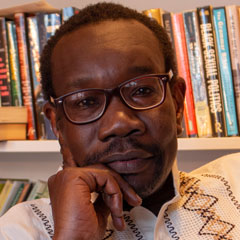Amir Idris
-
PhD, African History, Queen’s University, Canada, 2000
MA, African History, Queen’s University, Canada, 1995
MA, Political Science, American University in Cairo, 1992
BSc, Political Science, University of Khartoum, Sudan, 1990
-
Amir Idris specializes in African history and politics, African intellectual history, and postcolonial critique of racial and ethnic configurations. His research is concerned with contemporary debate on the history and politics of colonialism, on slavery and race, and on postcolonial citizenship in Northeast and Central Africa. His recent publications include Race, Ethnicity, and Violence in South Sudan (2024), South Sudan: Post-Independence Dilemmas (2018), Editor, Identity, Citizenship, and Violence in Two Sudans: Re-imagining a Common Future (2013), and Sudan’s Civil War: Slavery, Race, and Formational Identities (2001).
Idris has a special interest in the intersection of history, politics, and identity and representation in the postcolony. His work traces the history of the idea of race and its intellectual ramifications in defining, categorizing, and governing fractured ethnic and racial societies. His interest in this subject has led to critical engagements with the role of language, representation, and the manufacturing of minorities in the colonial and postcolonial geographies. Idris teaches courses such as African History, African Intellectual History, Debates in African Studies, and the United States, Africa, and the Cold War, among others. His courses focus on the dynamics and fluidity of history, culture, and politics in interlinked world. His recent research on areas of migration and exchange, global empires, and cultural transfers offers comparative insights from different regions (Africa, Europe, North America, Asia, etc.). The goal of this new research is to understand how the history of global empires contributed to the fragmentation of human geographies and similarities of cultures.
